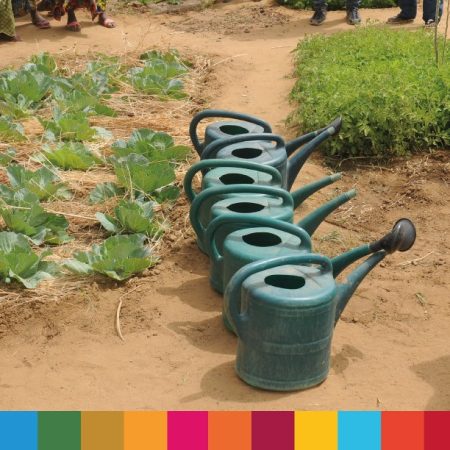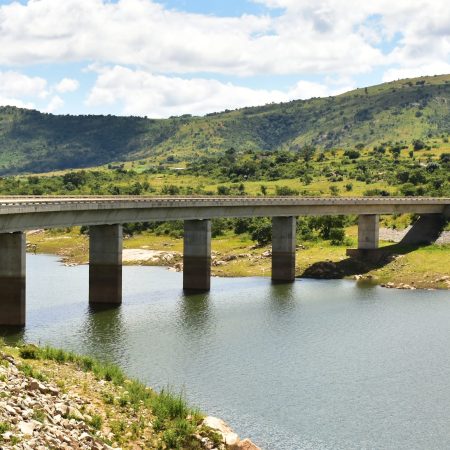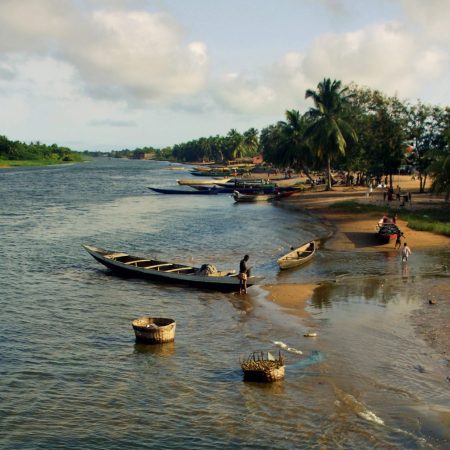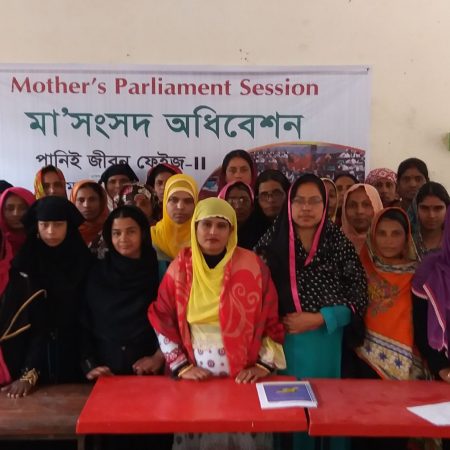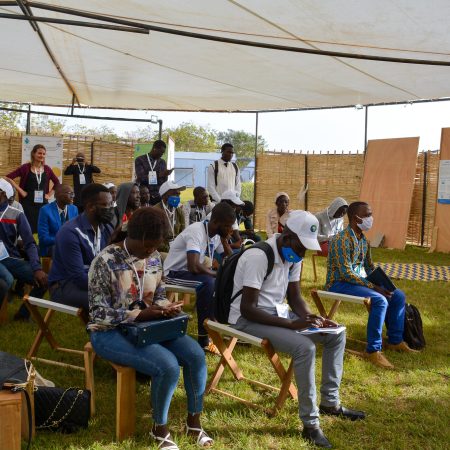Areas of work
In 2021, GWP focused on increasing the impact of the SDG 6 IWRM Support Programme (SDG 6-SP). Run by GWP in partnership with UNEP, UNEP-DHI, and UNDP Cap-Net, this programme assists governments in designing and implementing country-led responses to SDG indicator 6.5.1 – ‘the degree of implementation of integrated water resources management (IWRM)’, to accelerate progress towards the water-related SDGs.
Key achievements included:
- Preparing and launching a global report on the status of SDG 6.5.1, highlighting that the world needs to at least double its current rate of progress towards IWRM implementation to reach the 2030 goal
- Assisting one region (Central America) and one continent (Asia-Pacific) in preparing and launching regional reports in partnership with key regional bodies
- Producing two thematic reports building on those results on multi-stakeholder processes and gender mainstreaming in water resources management, the latter focusing on seven key enablers that countries can follow
- Supporting five countries (Bangladesh, Nepal, Nicaragua, Panama, and Tanzania) in preparing national IWRM Action Plans, using the new IWRM Acceleration Package, and capturing the results on the IWRM Action Plan Searcher
- Assisting seven countries (Armenia, Ghana, Guatemala, Kenya, Mali, Senegal, and Vietnam) in implementing solutions to enhance water security through an IWRM approach. Two of the activities (in Armenia and Vietnam) were supported through UNDP, leveraging over US$200,000
- Launching a funding matchmaking initiative to connect country IWRM priorities with local funding and donors, which is being piloted in Guatemala and Kenya.
GWP’s strategic imperative in the climate space has been defined as catalysing climate-resilient development through national adaptation planning, integrated resilience planning, and facilitating access to climate finance. Many achievements in these areas were documented in a 2021 publication, ‘Mobilising Change: 10 years of climate resilient water investments’.
GWP has been appointed as a delivery partner for countries to access the Green Climate Fund (GCF) Readiness and Preparatory Support Programme. In 2021, GWP-supported applications, worth more than US$2 million, were approved for:
- Eswatini – to strengthen the National Designated Authority’s (NDA) institutional and technical capacity to mobilise gender-responsive climate finance (US$566,000)
- Somalia – for capacity building and institutional strengthening (US$670,000)
- Sri Lanka – to strengthen the capacity of Direct Access Entities, the NDA, and GCF project programming stakeholders to access climate finance (US$672,000).
The GCF 2021 Readiness Country Proposal for the Central African Republic was also approved in 2021, with a grant of US$443,130 awarded to the government to advance the country’s programme by supporting the NDA and country stakeholders in programme development for climate finance. This readiness proposal received much support from GWP Central Africa.
GWP support also led to the enhancement of Nationally Determined Contributions (NDCs) in five countries: Sudan, Somalia, the Dominican Republic, Ecuador, and Paraguay. This shows an increasing global commitment to prioritising water when planning for climate adaptation and disaster risk reduction.
Over the past year, work continued on addressing the water investment gap in Africa. In February 2021, African Union (AU) Heads of State adopted the Continental Africa Water Investment Programme (AIP) during the AU Summit in Ethiopia. GWP has been instrumental in establishing an International High-Level Panel on Water for Africa to accelerate progress towards SDG 6 through the expansion and prioritisation of water investments. The High-Level Panel was formally launched on 25 March 2022, during the 9th World Water Forum in Dakar, Senegal.
Despite the limitations of COVID-19, GWP continued facilitating regional dialogues which focused on policy and technical instruments to address transboundary water management.
Five regional organisations and more than 10 transboundary water management institutions were supported by GWP including:
- The Volta Basin Authority – via ‘Integrating Flood and Drought Management and Early Warning Systems in the Volta Basin’
- The International Commission for the Protection of the Danube River – in relation to the Danube River Basin Management Plan and Danube Flood Risk Management Plan Updates
- The Central American Commission for Environment and Development – on the development of regional guidelines for transboundary waters in Central America.
The Massive Open Online Course on transboundary freshwater security, which was launched in 2020, continued to expand in 2021 – attracting over 2,300 participants from 150 countries. The course is rolling out more language versions to reach an even larger audience. Following up on the post-course survey, which showed that the online sessions were key to attracting participation, a series of events called ‘transboundary freshwater security governance train’ were organised in collaboration with the Wuhan International Water Law Academy (IWLA), as well as SIWI who collaborated on the last event.
To showcase and disseminate a range of practices that have been implemented in different countries to mainstream gender in water resources management, GWP published a report titled ‘Advancing towards gender mainstreaming in water resources management‘.
The report presents the key findings of a study, which analysed the results of a survey on SDG 6.5.1 completed by 172 countries. It showed that gender-related questions were the least advanced among all aspects of IWRM. It highlights common gaps and provides a range of recommendations.
More women are needed in leadership and decision-making positions in water diplomacy and transboundary water cooperation settings. This was the view of almost 100 women water practitioners from Egypt, Jordan, Lebanon, Morocco, and Palestine, interviewed for the ‘Comparative Study on Empowering Women in Water Diplomacy in the MENA region’, which was jointly elaborated by GWP Mediterranean and the Geneva Water Hub.
An initiative grew from this work, and in 2021 Network members were given support to strengthen their career paths and enhance their opportunities for leadership roles in water management and diplomacy-related careers.
This was done through the ‘90-Minute series’, a set of interactive Q&A sessions with prominent diplomats and transboundary water cooperation experts, covering themes drawn from the findings of the Comparative Study, and built around an experiential learning process as one of the most effective ways to promote professional integration and leadership skills.
In order to broaden the audience for GWP’s Gender Action Piece, it was translated into French, Spanish, and Russian.
Over the past year, GWP’s engagement with youth has grown considerably with the launch of the Water Academy for Youth (W.A.Y.). It is an initiative designed to advance effective youth engagement in water resources management. The GWP W.A.Y. is an opportunity for young professionals to realise their potential in the water community by becoming influencers and leaders. It aims to create momentum with key actors, and enhance meaningful youth engagement and empowerment in water resources management.
The first global activity was a joint GWP, Cap-Net UNDP, University of Andres/UNESCO free online course titled ‘From Learning to Leading: Beyond the ABCs of Youth, Water, and the SDGs’, which focused on building youth capacity on actionable solutions and the steps needed for a successful campaign or project. Following this, the GWP Caribbean Water Academy for Youth was launched. This three-month programme was designed to build IWRM capacity of young Caribbean leaders aged 20–35 years and connect them to water experts in the region. Thirty-two young professionals from 12 countries took part.
Another flagship youth programme in GWP is the Youth for Water and Climate (YWC), which launched two events in 2021: the YWC Programme for Youth leaders in Climate and Water, to be implemented in 2022 and a call for projects for the 2nd Global Youth Take Action. Nine youth-led projects were selected for seed funding and technical support.
GWP also established the Global Integrated Flood and Drought Management Competition for youth-led projects in collaboration with the World Meteorological Organization and the Water Youth Network which aims to show how youth involvement can benefit the development of people-centred approaches to early warning systems. Winning projects are awarded funding and technical support for implementation.

